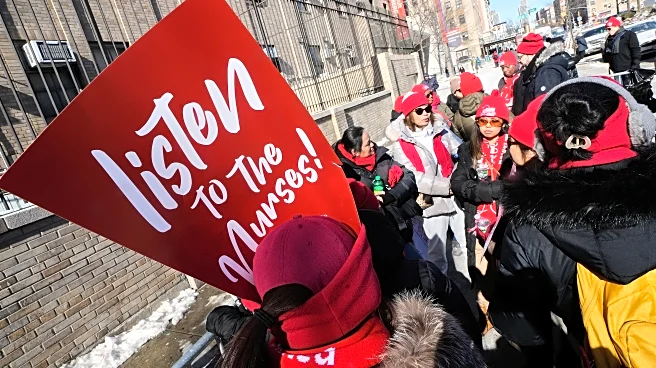What's Happening?
The Senate has failed to pass a government funding plan, leading to increased tensions on Capitol Hill. The government shutdown has now entered its ninth day, with significant impacts on federal operations. Representative Mike Lawler, a Republican from New York, was involved in a viral confrontation with Democratic Leader Hakeem Jeffries, highlighting the partisan divide over budgetary issues. The shutdown has affected various federal agencies, including the National Parks Service and the Internal Revenue Service, which have faced budget and staffing cuts. The IRS has furloughed nearly half of its workforce, potentially impacting tax processing and enforcement activities.
Why It's Important?
The failure to pass a government funding plan has significant implications for federal operations and employees. The shutdown affects essential services and could lead to delays in tax processing and enforcement, impacting both individuals and businesses. The partisan divide exemplified by the confrontation between Rep. Lawler and Leader Jeffries underscores the challenges in reaching a consensus on budgetary matters. The ongoing shutdown could lead to increased public dissatisfaction and pressure on lawmakers to resolve the impasse. Federal workers, particularly those in affected agencies, face uncertainty regarding job security and financial stability.
What's Next?
As the shutdown continues, pressure mounts on lawmakers to negotiate a resolution. The prolonged impasse may lead to increased public scrutiny and calls for accountability from both parties. Stakeholders, including federal employees and affected industries, are likely to advocate for a swift resolution to minimize disruptions. The confrontation between Rep. Lawler and Leader Jeffries may prompt further discussions on bipartisan cooperation to address budgetary challenges. The Senate will need to reconvene and attempt to pass a funding plan to restore government operations and alleviate the impact on federal agencies.
Beyond the Headlines
The government shutdown highlights deeper issues within the U.S. political system, including the challenges of bipartisan cooperation and effective governance. The confrontation between lawmakers reflects broader societal divisions and the difficulty in achieving consensus on critical issues. The impact on federal workers and services raises ethical concerns about the prioritization of political agendas over public welfare. Long-term, the shutdown could influence public perception of government effectiveness and trust in political leaders, potentially affecting future elections and policy decisions.









